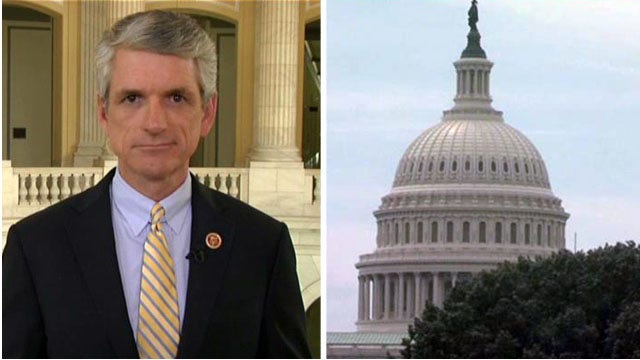This is a rush transcript from "Your World," August 29, 2013. This copy may not be in its final form and may be updated.
NEIL CAVUTO, HOST: And now this is getting loud. At least 140 House members, including 21 Democrats, signing this letter to President Obama. In it, they say that the president needs Congress' OK before authorizing any military strike on Syria, and that anything short of that would violate the Constitution.
Virginia Republican Congressman Scott Rigell is the fellow leading this charge. He says that Speaker John Boehner needs to call back House members right now to discuss any Syria action. Meantime, the president, we're told, just called Speaker Boehner to discuss concerns in this letter and the legal justification for any potential military action.
Now to the guy who authored that letter, Congressman Rigell.
Congressman, very good to have you.
REP. SCOTT RIGELL, R-VA.: Thank you, Neil. It's an important topic.
CAVUTO: Yes. I noticed that key Republican House leadership, including Speaker Boehner, have not signed this letter. What am I to read into that?
RIGELL: Well, I'm not really too surprised and I'm certainly not offended by that.
The speaker has ratcheted up his I think requirement or expectation of the president. He has not yet come forth with a definitive request for statutory authorization, and I think that's a clear difference and something that I hope the speaker really insists on. We are the 140 members that you mentioned, including 21 of my Democratic colleagues, which I'm very encouraged by. This is a bipartisan effort. It's not personal to the president.
It's simply kind of a constitutional 101. That is that absent the United States being under attack or about to be under attack, in the situation like we face in Syria, a real moral dilemma, a strategic national security dilemma, the president has to the time and indeed the obligation to come first to this institution, not simply for consultation, but statutory authority, before -- before engaging U.S. forces.
CAVUTO: So, you want a vote yea or nay from Congress to write off on whatever the president wants to do.
RIGELL: That's correct.
CAVUTO: I believe Speaker Boehner is saying in his correspondence, phone calls, whatever you want to call it with the president, you need to really give us the rationale for doing this to explain how this fits into your Mideast policy. I'm paraphrasing there, Congressman.
But he didn't require -- he came one step shy of demanding a congressional vote on this. You say the vote is important. Why?
(CROSSTALK)
RIGELL: Well, it's absolutely important. Only Congress has the power to declare war. And I'm really concerned, Neil, that really across our country, even expressed in our commander in chief, when he starts referring to a strike as limited or tailored, there's nothing limited or tailored about a Tomahawk cruise missile, especially if you're on the receiving end of that.
And I think we have become a little bit kind of a cold -- and coldly indifferent to what it means to engage in a military operation like this. I'm not saying I'm unwilling. And in certain cases, it's absolutely necessary. But it ought to be deliberative, and absent us being under attack or an attack imminent, that's where the president can act unilaterally.
And not only can he do that. He's -- that is his duty, and I would stand by him if that were the case. That's not the case here. We have time. He is going to -- seeking legitimacy from other nations, trying to build a coalition. I think that's appropriate.
But the moral foundation upon which to engage U.S. forces is found in one place only, by following the Constitution and asking this deliberative body, this legislative body, the people's representatives in the House and Senate, for specific statutory approval. That's the proper foundation.
CAVUTO: Congressman, what if the president were to call you right after this show -- he watches this show -- he doesn't say it, but he does.
Anyway, he's watching this and hearing you, and he calls you up and he says, Congressman, I hear what you're saying. Time isn't on our side. I can't get all of Congress back, have them debate this, vote on this, while this guy could pounce on still more chemical weapons.
What would you say to that?
RIGELL: Within 24 hours, I'm convinced this body could be in session, both the House and Senate. We have modern transportation methods and communication methods. We surely could be back in session within...
CAVUTO: No, I have no doubt you could get all your heinies back there. You're there, but the idea being to debate it, vote on it. The president might argue, wait a minute, there's no time.
(CROSSTALK)
RIGELL: Well, as you mentioned in your opening piece there, the British Parliament had this robust debate. I was able to watch much of it.
CAVUTO: Absolutely.
RIGELL: And this is proper. There was no sense there that something was imminent.
Now, if he had legitimate intelligence and he shared this, for example, with senior leadership of the House and Senate, and he acted because time was of the essence, I would support that. That's not what we're faced with here, at least so far as I know.
CAVUTO: All right.
Congressman, thank you very, very much.
RIGELL: Thank you.
CAVUTO: And this is a bipartisan effort, with those 20-plus Democratic signatures.
RIGELL: It is.
CAVUTO: All right.
Content and Programming Copyright 2013 Fox News Network, LLC. ALL RIGHTS RESERVED. Copyright 2013 CQ-Roll Call, Inc. All materials herein are protected by United States copyright law and may not be reproduced, distributed, transmitted, displayed, published or broadcast without the prior written permission of CQ-Roll Call. You may not alter or remove any trademark, copyright or other notice from copies of the content.






















